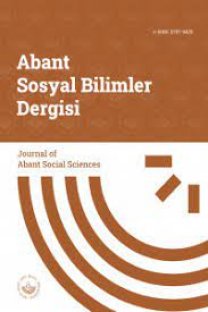AHLAKİ ÇÖZÜLME (MORAL DISENGAGEMENT) ÖLÇEĞİ TÜRKÇE GEÇERLEMESİ VE KİŞİ-ÇEVRE UYUMU İLİŞKİSİ
Bu çalışmanın amacı, çalışanların ahlaki çözülme (moral disengagement) eğilimleri ile kişi-çevre uyumu algılamaları arasındaki ilişkinin açıklanması ve ahlaki çözülme ölçeğinin Türkçe literatürde geçerleme çalışmasının yapılmasıdır. Ahlaki çözülme ile kişi-çevre uyumu arasındaki ilişkiyi incelemek için Kayseri ilinde faaliyet gösteren yiyecek-içecek işletmeleri çalışanlarından veri toplanmıştır. Araştırma verileri bir yıl ve daha uzun süredir faaliyette bulunan on yiyecek-içecek işletmesinin 284 çalışanından anket formu ile temin edilmiştir. Araştırmada ahlaki çözülme; çalışanların etik olmayan örgütsel davranışlara ilişkin algılamaları göz önüne alınarak ölçülmüştür. Kişi-çevre uyumu ise kişi-meslek, kişi-grup, kişi-örgüt ve kişi-iş olmak üzere dört boyutta ölçülmüştür. Korelasyon analizi sonuçlarına göre ahlaki çözülmenin kişi-çevre uyumu boyutları ile negatif ilişkisi olduğu tespit edilmiştir. Aynı zamanda, Moore ve arkadaşları (2011) tarafından geliştirilen ve kullanılan Ahlaki çözülme ölçeğinin geçerleme çalışmasında tek faktörlü yapısının doğrulandığı anlaşılmıştır.
Anahtar Kelimeler:
Ahlaki Çözülme, Kişi-Çevre Uyumu, Yiyecek-içecek İşletmeleri.
___
- Argyris, Chris (1964). Integrating the Individual and the Organization. New York: John Wiley&Sons.
- Bandura, Albert (1999). “Moral Disengagement in the Perpetration of Inhumanities”. Personal and Social Psychology Review 3: 193-209.
- Barsky, Adam (2008). “Understanding the Ethical Cost of Organizational Goal-setting: A Review and Theory Development”. Journal of Business Ethics 81 (1): 63-81.
- Barriga, Alvaro Q. ve Gibbs, John C. (1996). “Measuring Cognitive Distortion in Antiscoial Youth: Development and Preliminary Validation of the How I Think Questionnaire”. Aggressive Behavior 22(5): 333-343.
- Brown, Michael E., Trevino, Linda K. ve Harrison, David A. (2015). “Ethical Leadership: A Social Learning Perspective for Construct Development and Testing”. Organizational Behavior and Human Decision Processes 97 (2): 117-134.
- Christian, J. Siegel ve Ellis, Aleksander P. J. (2014). “The Crucial Role of Turnover Intentions in Transforming Moral Disengagement Into Deviant Behavior at Work”. Journal of Business Etchics 119: 193-208.
- Çarpık, Cantürk (2014). “Geçerlik ve Güvenirlik Çalışmalarında Doğrulayıcı Faktör Analizinin Kullanımı”. Anadolu Hemşirelik ve Sağlık Bilimleri Dergisi 17 (3): 196-205.
- Detert, James R., Trevino, L. Klebe K. ve Sweitzer, Vicki L. (2008). “Moral Disengagement in Ethical Decision Making: A Study of Antecedents and Outcomes”. Journal of Applied Psychology 93: 374-391.
- Edwards, Jeffery R. ve Shipp, Abbie J. (2007). “The Relationship Between Person-environment Fit and Outcomes: An Integrative Theoretical Framework”. Perspectives on Organizational Fit. Ed. C. Ostroff ve T. A. Judge. New York: Lawrence Erlbaum Associatepp. 209-258.
- Festinger, Leon (1957). A Theory of Cognitive Dissonance. Stanford: Stanford University Press.
- Gibbs, John C., Potter, Granville B. ve Goldstein, Arnold P. (1995). The EQUIP Program: Teaching Youth to Think and Act Responsibly through a Peer-Helping Approach. Champaign, IL: Research Press.
- Kouchaki, Maryam ve Wareham, Justin (2015). “Excluded and Behaving Unethically: Social Exclusion, Physiological Responses, and Unethical Behavior”. Journal of Applied Psychology 100 (2): 547-556
- Irak, Doruk U. (2012). “İşyerinde Birey-Çevre Uyumu: Kuramsal Yaklaşımlar ve Örgütsel Psikolojideki Yeri”. Türk Psikoloji Yazıları 15 (30): 12-22.
- Mastracci, Sharon H., Newman, Meredith A. ve Guy, Mary E. (2006). “Appraising Emotional Work: Determining Whether Emotional Labor is Valued in Government Jobs”. American Review of Public Administration 36 (2): 123-138.
- Moore, Celia, Detert, James R., Trevino, Linda K., Baker, Vicki L. ve Mayer, David M. (2011). “Why Employees Do Bad Things: Moral Disengagement and Unethical Organizational Behavior”. Personnel Psychology 65: 1-48.
- Ntayi, J Mpeera M., Eyaa, Sarah ve Ngoma, Muhammed (2010). “Moral Disengagement and the Social Construction of Procurement Officers’ Deviant Behaviours”. Journal of Management Policy and Practice 11 (4): 95-110.
- O’Reilly, Charles A.,Chatman, Jennifer, ve Caldwell, David F. (1991). “People and Organizational Culture: A Profile Comparison Approach to Assessing Person-organization Fit”. Academy of Management Journal 34 (3): 487-516.
- Ordonez, Lisa D. ve Welsh, David T. (2015). “Immoral Goals, How Goal Setting may Lead to Unethical Behavior”. Current Opinion in Psychology 6: 93-96.
- Özgener, Şevki, Demirtaş, Özgür. ve Ulu, Seher (2013). “Kişi-çevre Uyumu ile Sosyal Tembellik İlişkisinde Pozitif Psikolojik Sermayenin Aracı Rolü”. I. Örgütsel Davranış Kongresi. Sakarya: Sakarya Üniversitesi. 404-412.
- Peterson, Dane K. (2002). “Deviant workplace behavior and the organization's ethical climate”. Journal of Business and Psychology 17: 47-61.
- Reynolds, Scott J. vd. (2014). “The Role of Moral Knowledge in Everyday Immorality: What Does It Matterif I Know What is Right?”. Organizational Behaviorand Human Decision Processes 123: 124-137.
- Ribeaud, Denis ve Eisner, Manual (2010). “Are Moral Disengagement, Neutralization Techniques, and Self-Serving Cognitive Distortions the Same? Developing a Unified Scale of Moral Neutralization of Aggression”. International Journal of Conflict and Violence 4 (2): 298-315.
- Saidon, Intan M., Galbreath, Jeremy ve Whiteley, Alma (2010). “Antecedents of moral disengagement: Preliminary empirical study in Malaysia”. 24th Annual Australian and New Zealand Academy of Management Conference. Adelaide, SA: Australian and New Zealand Academy of Managemen (ANZAM).
- Sykes, Gresham M., ve Matza, David (1957). “Techniques of Neutralization: A Theory of Delinquency”. American Sociological Review 22 (6): 664–70.
- Thonberg, Robert ve Jungert, Tomas (2013). “Bystander Behavior in Bullying Situations: Basic Moral Sensitivity, Moral Disengagement and Defender Self-efficacy”, Journal of Adolescene 36 (3): 475-483.
- Vogel, Ryan M. ve Feldman, Daniel C. (2009). “Integrating the Levels of Person-environment Fit: The Roles of Vocational Fit and Group Fit”. Journal of Vocational Behavior 75: 68-81.
- Yazıcıoğlu, Yahşi ve Erdoğan, Saniye (2004). Spss Uygulamalı Bilimsel Araştırma Yöntemleri. Ankara: Detay Yayıncılık.
- Yayın Aralığı: Yılda 3 Sayı
- Başlangıç: 2000
- Yayıncı: Abant İzzet Baysal Üniversitesi Sosyal Bilimler Enstitüsü
Sayıdaki Diğer Makaleler
PORTFÖY SEÇİMİNDE TOPLAM RİSKİ TEMEL ALAN PORTFÖY PERFORMANS ÖLÇÜTLERİNİN DEĞERLENDİRİLMESİ
Mehmet Fatih BAYRAMOĞLU, Nagihan YAYALAR
İKİNCİ SİYER ZEYLİNİN ÖN SÖZÜ VE NÂBÎ HAKKINDA YENİ BİLGİLER
TOPLUM - ANLAM İLİŞKİSİ AÇISINDAN ANLAMIN SOSYALLİĞİ
Ömer Lütfi ANTALYALI, Özgür BOLAT
OKUL ÖNCESİ ÖĞRETMENLERİNİN ÖĞRETMEN YETERLİKLERİ VE HİZMET İÇİ EĞİTİM İHTİYAÇLARI
AHLAKİ ÇÖZÜLME (MORAL DISENGAGEMENT) ÖLÇEĞİ TÜRKÇE GEÇERLEMESİ VE KİŞİ-ÇEVRE UYUMU İLİŞKİSİ
Emre ERBAŞ, Nilüfer ŞAHİN PERÇİN
SAFİYE EROL ROMANLARINDA KADIN OLGUSU
Mustafa AYYILDIZ, Rahime BAYTOK
GELENEKSEL ÜRÜN TÜKETİMİNİ ETKİLEYEN FAKTÖRLER ÜZERİNE BİR ARAŞTIRMA
Ebru ONURLUBAŞ, Kemalettin TAŞDAN
HİCRİ TAKVİM ETKİSİNİN BIST SEKTÖR ENDEKSLERİNDE TEST EDİLMESİ
